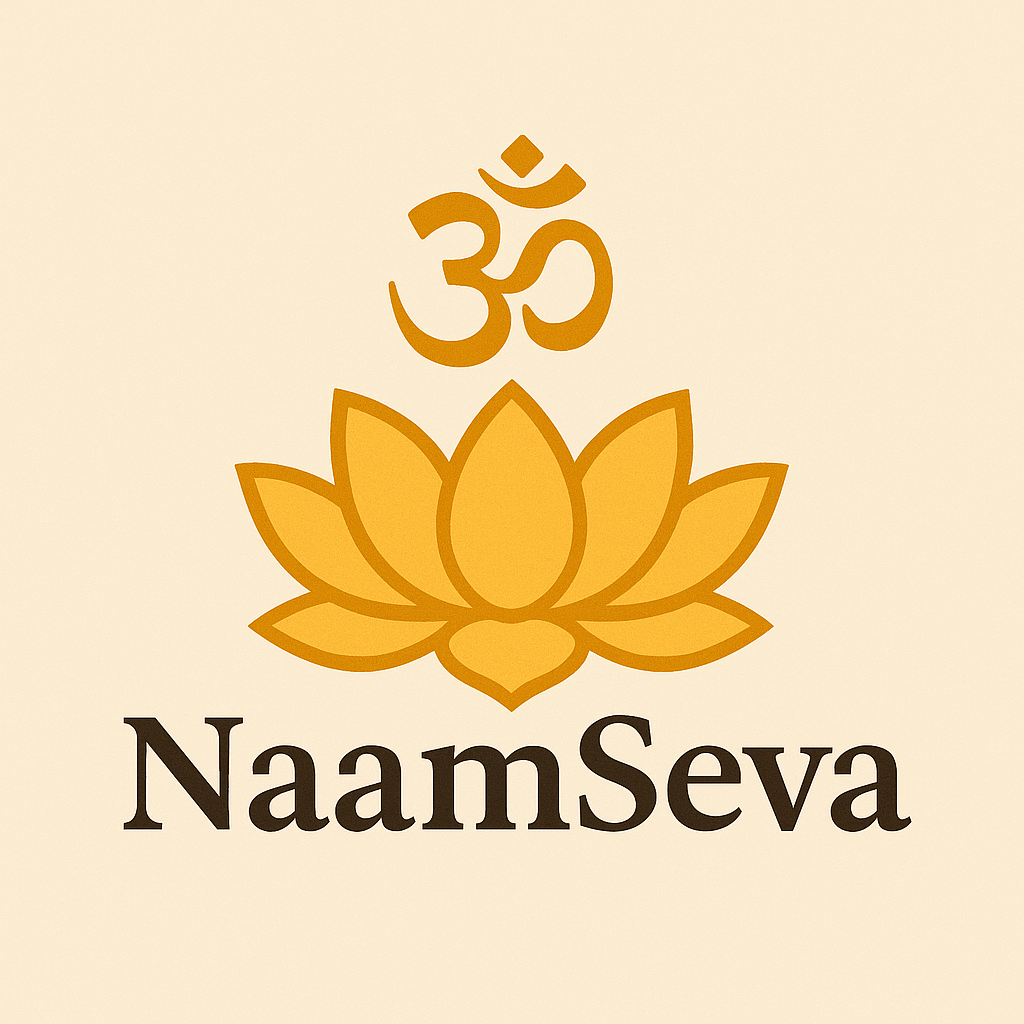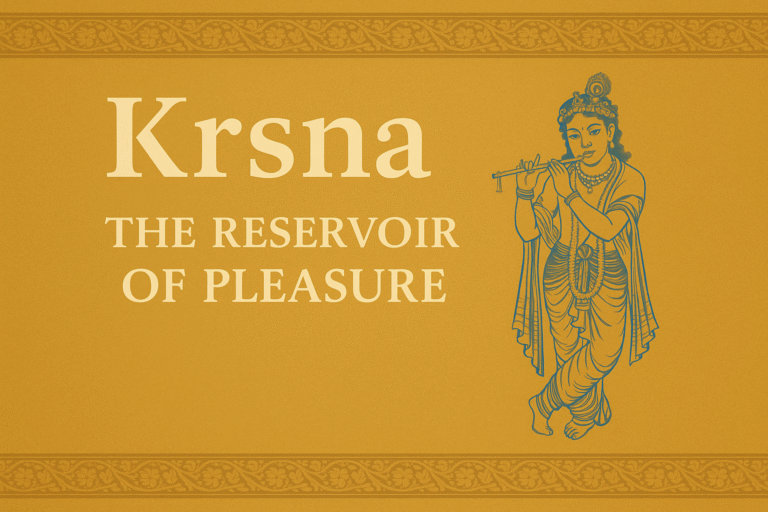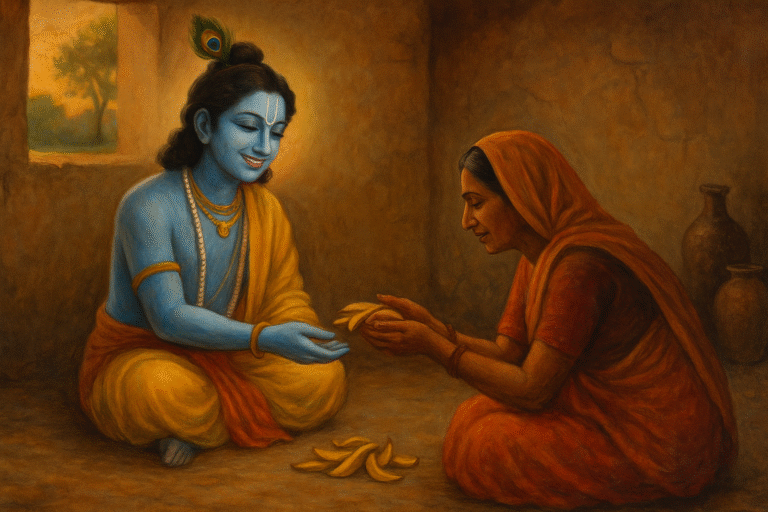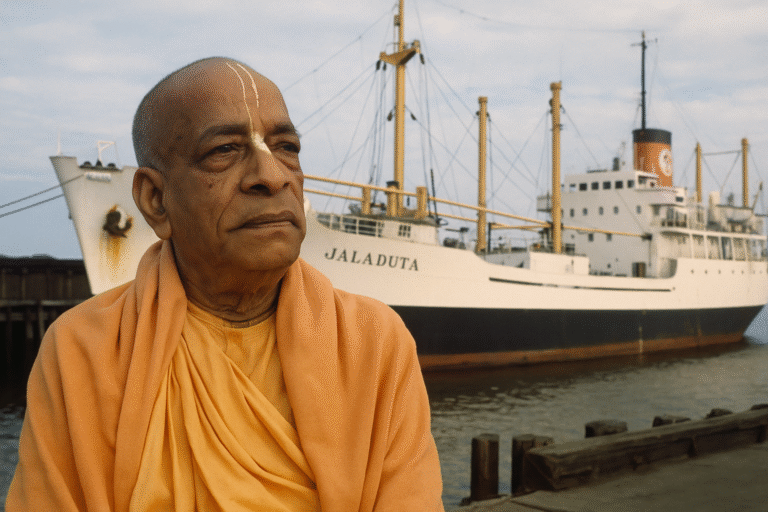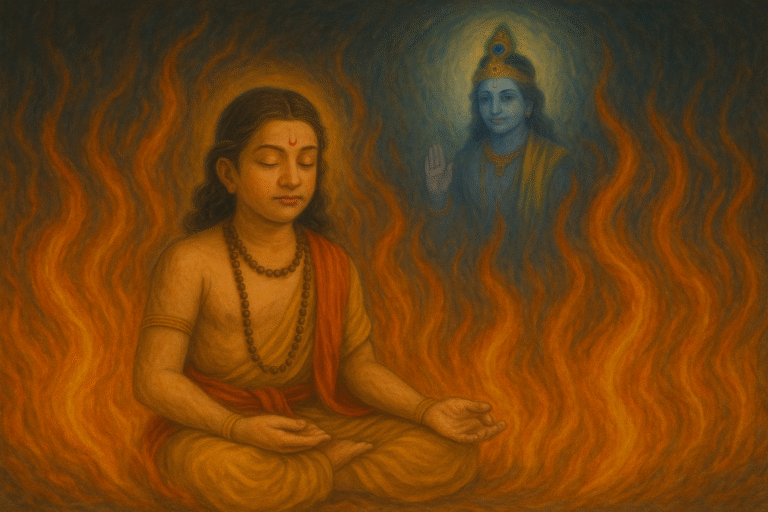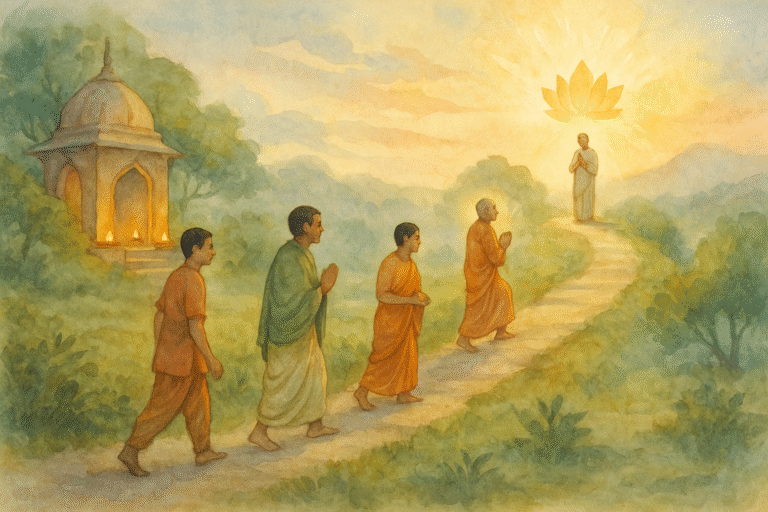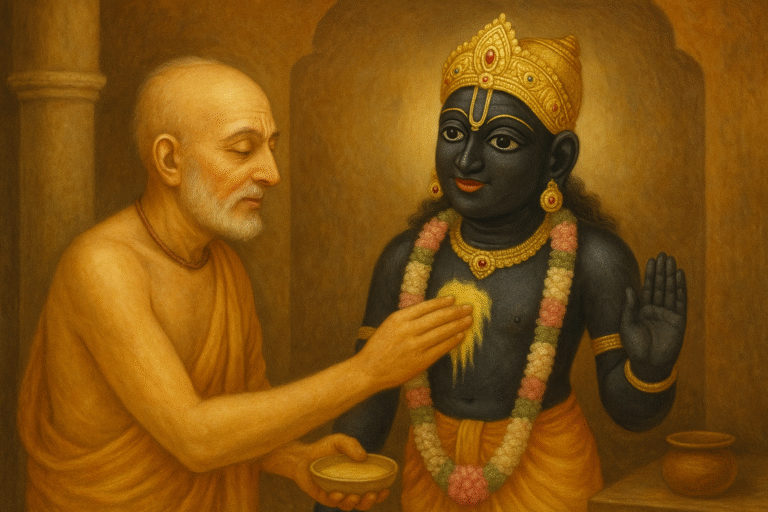दामोदर अष्टकम (Damodarastakam): The Song That Melts the Heart of God
Damodarāṣṭakam is a sacred hymn sung during the Kartik month, celebrating Lord Krishna’s divine pastime of being bound by Mother Yashoda’s love. Composed by Satyavrata Muni, it reveals that God is conquered not by power but by pure devotion. Each verse melts the heart, teaching that love surpasses liberation.
Introduction
Among the thousands of prayers in the Bhakti tradition, few shine as brightly as the Damodarāṣṭakam — eight divine verses that capture the essence of loving devotion (prem-bhakti) between the Lord and His pure devotees. This prayer is sung daily during the Kartik month (Damodar month) by devotees of Lord Krishna worldwide.
The Damodarāṣṭakam, found in the Padma Purāṇa and composed by the sage Satyavrata Muni, beautifully describes Lord Krishna’s childhood pastime of being bound by mother Yashoda’s love. Though He is the Supreme Controller of all universes, He allows Himself to be tied by the simple rope of maternal affection — hence the name “Dāmodara” (one whose belly is bound by a rope).
Background and Context
The episode of Damodara-līlā occurs in Śrīmad Bhāgavatam (10th Canto, Chapter 9). Mother Yashoda tries to bind little Krishna with a rope after catching Him stealing butter. Despite adding rope after rope, she finds it always two fingers short. Finally, when Krishna sees her exhaustion and sincere love, He allows Himself to be bound — not by strength, but by love (bhakti-bandhan).
This event is not a mere story; it conveys the highest philosophy of Bhakti Yoga — that God is conquered only by love. Even omnipotence bows before pure affection.
Sanskrit Text with Meaning
Let’s look at each verse and its meaning in brief.
Verse 1
नमामीश्वरं सच्चिदानन्दरूपं
लसत्कुण्डलं गोकुले भ्राजमानम्।
यशोदाभियोऽलूकलाद् धावमानं
परामृष्टम् अत्यन्ततो द्रुत्य गोप्या॥
Meaning:
I bow to the Supreme Lord, whose form is eternal, full of knowledge and bliss. His shining earrings swing as He runs through Gokula, frightened of Mother Yashoda, who pursues Him to catch Him and bind Him to the mortar.
Essence:
The Infinite is running before the finite — the Almighty fleeing from a devotee’s love! This is the beauty of Krishna’s pastimes.
Verse 2
रुदन्तं मुहुर् नेत्रयुग्मं मृजन्तं
कराम्भोजयुग्मेन सातङ्कनेत्रम्।
मुहु: श्वासकम्पत्रिरेखाङ्ककण्ठ
स्थितग्रैवं दामोदरं भक्तिबद्धम्॥
Meaning:
Crying repeatedly, rubbing His eyes with His lotus hands, His eyes filled with fear, the rope around His belly marked His divine neck. Thus, the Supreme Lord was bound by devotion.
Essence:
The Lord who ties the universe together by His will is Himself tied by a mother’s love — the power of bhakti surpasses all.
Verse 3
इतीदृक् स्वलीलाभिरानन्दकुण्डे
स्वघोषं निमज्जन्तमाख्यापयन्तम्।
तदीयेषितज्ञेषु भक्तैर् जितत्वं
पुनः प्रेमतस् तं शतावृत्ति वन्दे॥
Meaning:
By these divine pastimes, the Lord drowns the inhabitants of Gokula in an ocean of bliss and reveals that only His devotees can conquer Him through love.
Essence:
Even the all-knowing Lord declares Himself defeated — not by power or knowledge, but by love.
Verse 4
वरं देव मोक्षं न मोक्षावधिं वा
न चान्यं वृणेऽहं वरेषादपीह।
इदं ते वपुर्नाथ गोपालबालं
सदा मे मनस्याविरास्तां किमन्यैः॥
Meaning:
O Lord! I do not desire liberation or even eternal life. I only wish that this form of Yours — the sweet cowherd boy — may forever remain manifest in my heart.
Essence:
True devotion seeks not liberation but divine love — to always remember the beautiful form of the Lord.
Verse 5
इदं ते मुखाम्भोजमत्यन्तनीलैर्
वृतं कुन्तलैः स्निग्धरक्तैश्च गोप्या।
मुहुः चुम्बितं बिम्बरक्ताधरं मे
मनस्याविरास्तामलं लक्षलाभैः॥
Meaning:
May that lotus face of Yours, encircled by dark curly locks, kissed again and again by Mother Yashoda, and adorned with reddish lips, forever appear in my heart. What use are thousands of other blessings?
Essence:
The devotee’s only wealth is remembrance of Krishna’s smiling face.
Verse 6
नमो देव दामोदरानन्त विष्णो
प्रसीद प्रभो दुःखजालाब्धिमग्नम्।
कृपादृष्टिवृष्ट्यातिदीनं बतानु
गृहाणेष मां ज्ञाम् एध्यक्शिदृश्यः॥
Meaning:
O infinite Lord Damodara! Be pleased with me, who am drowning in the ocean of suffering. Shower Your mercy upon me with Your compassionate glance.
Essence:
The devotee seeks not escape from karma but the grace of the Lord’s merciful vision.
Verse 7
कुवेरात्मजौ बद्धमूर्त्यैव यद्वत्
त्वया मोचितौ भक्ति-भाजौ कृतौ च।
तथा प्रेम-भक्तिं स्वकां मे प्रयच्छ
न मोक्षे ग्रहो मेऽस्ति दामोदराह॥
Meaning:
Just as You delivered the sons of Kuvera, who were bound and cursed, please grant me pure love for You. I seek not liberation but devotion.
Essence:
Bhakti is superior to moksha — once love is obtained, liberation becomes insignificant.
Verse 8
नमस्तेऽस्तु दाम्ने स्फुरद्दीप्तिधाम्ने
त्वदीयोदरायाथ विश्वस्य धाम्ने।
नमो राधिकायै त्वदीयप्रियायै
नमोऽनन्तलीलाय देवाय तुभ्यम्॥
Meaning:
Obeisances to the shining rope that binds You, to Your divine belly which is the abode of the universe, to Radhika, Your dearest consort, and to You, O Lord of infinite pastimes.
Essence:
The final verse glorifies not only Krishna but also Srimati Radharani — the embodiment of supreme love.
Reflection for Modern Life
In today’s world of control and ambition, Damodarāṣṭakam reminds us that the Supreme is conquered not by power, but by love. Just as Krishna was bound by Yashoda, our hearts can bind Him through selfless devotion.
When we cry sincerely in prayer, when we serve others with compassion, we too become instruments of divine play (līlā).
The prayer ends beautifully — surrendering not for liberation, but for prem-bhakti, the eternal bond between soul and God.
Conclusion
The Damodarāṣṭakam is not just a hymn; it is the heartbeat of pure devotion. It teaches that the Lord of the cosmos can be bound — not by chains, but by the unbreakable thread of love.
As you light your lamp during Kartik month and sing these eight verses, remember:
“In this world, love alone has the power to bind even the Supreme Lord.”
